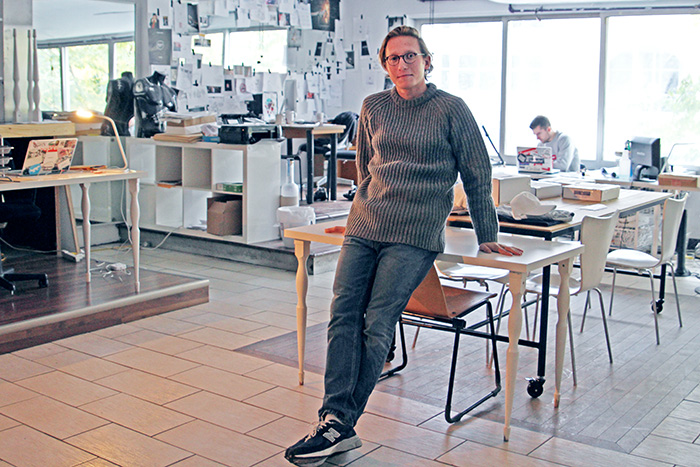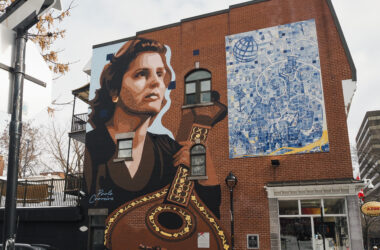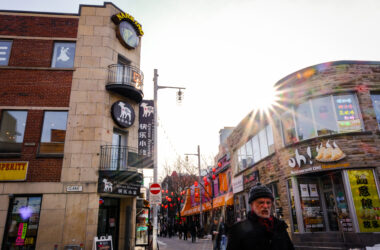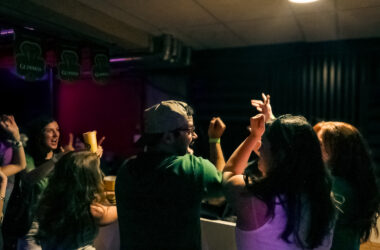Apartment 200, SuWu, and École Privée are clubs known for their unconventional conceptual design, hip-hop friendly atmosphere, and lines of young people stretching around the block. These venues are familiar to any Montrealer who frequents St-Laurent for a night out and they have begun to attract international attention from customers like Rihanna, Nas, Skepta, Mac Miller, and PARTYNEXTDOOR. These clubs are among the most prominent in the Montreal nightlife scene, and the common thread between them is SaintWoods. SaintWoods is a multipurpose project; what began as an artist booking and event promotions company has evolved into a club owner/fashion brand. The company is headed by Concordia alumnus Zach Macklovitch and McGill graduate Nathan Gannage. Under the pair’s tutelage, SaintWoods partnered in A5 Hospitality, who owned the three venues. Starting with SuWu in 2013, SaintWoods flipped the venues into the clubs they run today.
Macklovitch, who grew up on Montreal’s West Island, started when he was 16 years old as a club promoter. By 22, he was working as an artist booker for Time Supper Club, at which point he met Gannage and became a partner at SaintWoods. Macklovitch and Gannage’s business model as artist bookers was to always track present cultural trends, and then look past them for a new direction. For example, SaintWoods booked Avicii before his international popularity, aiming to introduce EDM to the college demographic.
“Our goal was to throw cutting edge events to people who weren’t maybe originally interested,” Macklovitch said. “It was always kind of what me and [Gannage] like to call ‘social experiments.’ That’s kind of the basis of the company [….] We liked giving people what they weren’t expecting.”
Macklovitch sticks by this experimental, culture-based model. He is passionate about SaintWoods being an arbiter of cool—keeping on top of trends is an art in itself. He explained that the SaintWoods model of ‘cool’ is based on what their team feels people are missing in their lives.
“[A cultural trend] comes from a want or a need of more,” Macklovitch explained. “A$AP Rocky popped off and streetwear popped off because there was a lack of that kind of music and that kind of fashion at the time [….] It’s always interconnected based on the cultural pendulum swinging left to right. Us at SaintWoods, we’re always looking. ‘Oh, it’s really left right now? It’s time to go right.’”
While Macklovitch loves Montreal, he never planned for his career to take off in his home city.
“I told everyone I was moving to New York and next thing you know we got the deal for SuWu, [known as Cafeteria at the time],” Macklovitch said. “[…] It just clicked. Then, [the owners of Cafeteria] had this other property, Ballroom, that was kind of hurting that they wanted us to flip.”
Ballroom soon became Apartment 200, a concept lounge based on the apartment loft parties and Brooklyn barcades that Macklovitch and Gannage visited in their trips to New York. They then opened Apartment 200 in Toronto, followed by École Privée in Montreal last year.
While looking to New York nightlife as inspiration for his work, Macklovitch admits that there is nowhere in the world like Montreal when it comes to having a good time. This is due largely to the nature of Montreal’s creative scene.
“It’s not cool in Montreal to be rich,” Macklovitch said. “It’s cool to be cool, it’s cool to be artistic. It’s cool to create your own fashion and to be able to do that without having a lot of money. It’s this super organic scene that’s also super inviting. We always laugh when people come from Toronto, who say to us, ‘Yo, Montreal’s so much fun.’ We’re like, yeah it’s a great time because people actually say, ‘What’s up?’ to you at the bar.”
Macklovitch admits that though he does want to get out of Montreal eventually, he is consistently inspired by what he calls Montreal’s “democratic cool.” This concept is identifiable in the way creative, successful people in the city are still friendly and welcoming.
“Every time I come home and there’s a proper turn up at Apartment [200] or some of those after parties, when you go to those you’re like, ‘Yo, there’s nothing like this in the entire world.’ There’s nothing this democratic. Nothing like where everyone you look at you’re like, ‘You’re cool as shit.’ Whereas you go to these other parties and not only are the people outside Montreal not as cool as the kids I know in Montreal, they aren’t as friendly! It’s like, ‘Yo! This is wack!’”
Macklovitch explains that this kind of cool in Montreal is diffuse, and is based more on character than on social status. Those who have a friendly attitude are his target demographic for SaintWoods’ three supposedly exclusive clubs.
“I’m down if that cool person goes to McGill, I’m down if that cool person is 35 and works at some insurance company,” Macklovitch said. “If you’re cool, I want you inside. But if you’re rude and you start fights, or you’re rude to girls, or you and your friends are being racist, then don’t come to my party! I don’t care if you’re 25, if you’re 35, no matter how much money you have. If you’re friendly and you have a good vibe it’s rare that you won’t get in.”
The most important thing Macklovitch has learned from being in the industry is to hold himself to the same moral standard in a nightclub that he would in any other professional environment.
“I don’t think those rules [of the nightlife world] absolve you of a general sense of morality,” Macklovitch said. “Just because you work in nightlife, it does not mean it’s okay to be a shitty boyfriend, or that it’s okay to do drugs at work, or to be rude to people. You may be less likely to be judged in those situations, but myself and my team hold ourselves to higher standards than most other industries would. [Nightlife] may have it’s own set of rules, but then you just have to go by your own playbook.”
In any case, Macklovitch looks beyond the nightlife world and its rules to inspire his work. Among his inspirations he lists the Montreal Mural Festival organizers, with whom SaintWoods shares its office, and Virgil Abloh, the creative director responsible for designing Kanye West’s floating concert stage. Macklovitch believes that looking at figures who are innovating in a variety of fields is essential for anyone who wants to find real success.
“The best advice I can give young people is, ‘Don’t look at the people who are doing what you want to do,’” Macklovitch said. “Look at the people you are amazed by that are doing something completely different. You’ll find more inspiration in that than in the people who are necessarily in your direct [field]. Don’t [necessarily] look to be inspired in your own city. Nathan and myself, we get inspired by going to Paris, New York, Berlin, my cousin’s country house, whatever!”
When asked to reflect on his favourite historical nightclubs, Macklovitch pauses. He admitted that he doesn’t think too much about those.
“I’m inspired by the future more than I’m inspired by the past,” Macklovitch said.
As a leading figure of the democratic cool of Montreal, Macklovitch and SaintWoods are evolving with the future in mind.
A previous version of this piece stated that SaintWoods bought the empty venues of SuWu, Apartment 200 and École Privée. SaintWoods in fact partnered in A5 Hospitality, who own the three venues.










Macklovitch definition of “cool” is a PR fix-it band aid to absolve him of his rude bouncers and staff…their idea of ‘cool’ is to be a basic Instagram baddie that could nab the attention of the ratchet boys or men in there.
Also, this idea that they are perpetuating the “cool” trends is off-point. They follow 2nd-hand trends after all the world’s cities have discarded the trends in the bin in search of new ones.
To the folks at the Trib, you should be better at doing research rather than drinking from the Saintwoods “Kool-Aid.”